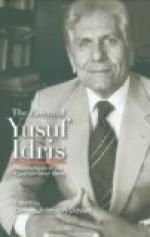|
This section contains 7,105 words (approx. 24 pages at 300 words per page) |

|
SOURCE: Salti, Ramzi. “A Different Leader of Men: Yusuf Idris Against Arab Concepts of Male Homosexuality.” World Literature Today 75, no. 2 (spring 2001): 247-56.
In the following essay, Salti elucidates the sociopolitical implications of Idris's depiction of homosexuality in A Leader of Men.
When Yusuf Idris (1927-91) published his controversial story “Abu al-rijal” (Eng. “A Leader of Men”) in the Egyptian magazine October in 1987, it was immediately hailed by scholars as the first and only work in modern Arabic literature to probe “so deeply in the mind and soul of a latent homosexual” (Elkhadem, 1988, 1). Consequently, many critics praised the story for daring to broach a subject that “is normally regarded in the Arab world as one about which feelings, thoughts, and words ought to be repressed” (Boullata, 83), one that is “regarded by the great majority in Islamic Egypt as repugnant and distasteful” (Elkhadem, 1). Even those scholars who did not perceive...
|
This section contains 7,105 words (approx. 24 pages at 300 words per page) |

|


